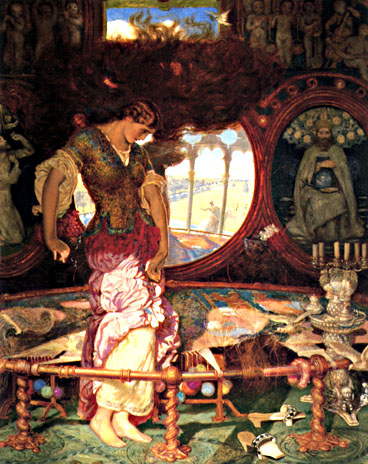|
THE LADY OF SHALLOT
PART I.
On either side the river lie
Long fields of barley and
of rye,
That clothe the wold and
meet the sky;
And thro’ the field the road
runs by
To many-tower’d Camelot;
And up and down the people
go,
Gazing where the lilies blow
Round an island there below,
The island of Shalott.
Willows whiten, aspens quiver,
Little breezes dusk and shiver
Thro’ the wave that runs
for ever
By the island in the river
Flowing down to Camelot.
Four gray walls, and four
gray towers,
Overlook a space of flowers,
And the silent isle imbowers
The Lady of Shalott.
By the margin, willow-veil’d,
Slide the heavy barges trail’d
By slow horses; and unhail’d
The shallop flitteth silken-sail’d
Skimming down to Camelot:
But who hath seen her wave
her hand?
Or at the casement seen her
stand?
Or is she known in all the
land,
The Lady of Shalott?
Only reapers, reaping early
In among the bearded barley,
Hear a song that echoes cheerly
From the river winding clearly,
Down to tower’d Camelot:
And by the moon the reaper
weary,
Piling sheaves in uplands
airy,
Listening, whispers ‘’Tis
the fairy
Lady of Shalott.’
PART II.
There she weaves by night
and day
A magic web with colours
gay.
She has heard a whisper say,
A curse is on her if she
stay
To look down to Camelot.
She knows not what the curse
may be,
And so she weaveth steadily,
And little other care hath
she,
The Lady of Shalott.
And moving thro’ a mirror
clear
That hangs before her all
the year,
Shadows of the world appear.
There she sees the highway
near
Winding down to Camelot:
There the river eddy whirls,
And there the surly village-churls,
And the red cloaks of market
girls,
Pass onward from Shalott.
Sometimes a troop of damsels
glad,
An abbot on an ambling pad,
Sometimes a curly shepherd-lad,
Or long-hair’d page in crimson
clad,
Goes by to tower’d Camelot;
And sometimes thro’ the mirror
blue
The knights come riding two
and two:
She hath no loyal knight
and true,
The Lady of Shalott.
But in her web she still delights
To weave the mirror’s magic
sights,
For often thro’ the silent
nights
A funeral, with plumes and
lights
And music, went to Camelot:
Or when the moon was overhead,
Came two young lovers lately
wed;
‘I am half sick of shadows,’
said
The Lady of Shalott.
PART III.
A bow-shot from her bower-eaves,
He rode between the barley-sheaves,
The sun came dazzling thro’
the leaves,
And flamed upon the brazen
greaves
Of bold Sir Lancelot.
A red-cross knight for ever
kneel’d
To a lady in his shield,
That sparkled on the yellow
field,
Beside remote Shalott.
The gemmy bridle glitter’d
free,
Like to some branch of stars
we see
Hung in the golden Galaxy.
The bridle bells rang merrily
As he rode down to Camelot:
And from his blazon’d baldric
slung
A mighty silver bugle hung,
And as he rode his armour
rung,
Beside remote Shalott.
All in the blue unclouded
weather
Thick-jewell’d shone the
saddle-leather,
The helmet and the helmet-feather
Burn’d like one burning flame
together,
As he rode down to Camelot.
As often thro’ the purple
night,
Below the starry clusters
bright,
Some bearded meteor, trailing
light,
Moves over still Shalott.
His broad clear brow in sunlight
glow’d;
On burnish'd hooves his war-horse
trode;
From underneath his helmet
flow’d
His coal-black curls as on
he rode,
As he rode down to Camelot.
From the bank and from the
river
He flash’d into the crystal
mirror,
‘Tirra lirra,’ by the river
Sang Sir Lancelot.
She left the web, she left
the loom,
She made three paces thro’
the room,
She saw the water-lily bloom,
She saw the helmet and the
plume,
She look’d down to Camelot.
Out flew the web and floated
wide;
The mirror crack’d from side
to side;
‘The curse is come upon me,’
cried
The Lady of Shalott.
PART IV.
In the stormy east-wind straining,
The pale yellow woods were
waning,
The broad stream in his banks
complaining,
Heavily the low sky raining
Over tower’d Camelot;
Down she came and found a
boat
Beneath a willow left afloat,
And round about the prow
she wrote
The Lady of Shalott.
And down the river’s dim expanse
Like some bold seër
in a trance,
Seeing all his own mischance–
With a glassy countenance
Did she look to Camelot.
And at the closing of the
day
She loosed the chain, and
down she lay;
The broad stream bore her
far away,
The Lady of Shalott.
Lying, robed in snowy white
That loosely flew to left
and right–
The leaves upon her falling
light–
Thro’ the noises of the night
She floated down to Camelot:
And as the boat-head wound
along
The willowy hills and fields
among,
They heard her singing her
last song,
The Lady of Shalott.
Heard a carol, mournful, holy,
Chanted loudly, chanted lowly,
Till her blood was frozen
slowly,
And her eyes were darken’d
wholly,
Turn’d to tower’d Camelot.
For ere she reach’d upon
the tide
The first house by the water-side,
Singing in her song she died,
The Lady of Shalott.
Under tower and balcony,
By garden-wall and gallery,
A gleaming shape she floated
by,
Dead-pale between the houses
high,
Silent into Camelot.
Out upon the wharfs they
came,
Knight and burgher, lord
and dame,
And round the prow they read
her name,
The Lady of Shalott.
Who is this? and what is here?
And in the lighted palace
near
Died the sound of royal cheer;
And they cross’d themselves
for fear,
All the knights at Camelot:
But Lancelot mused a little
space;
He said, ‘She has a lovely
face;
God in his mercy lend her
grace,
The Lady of Shalott.’

|